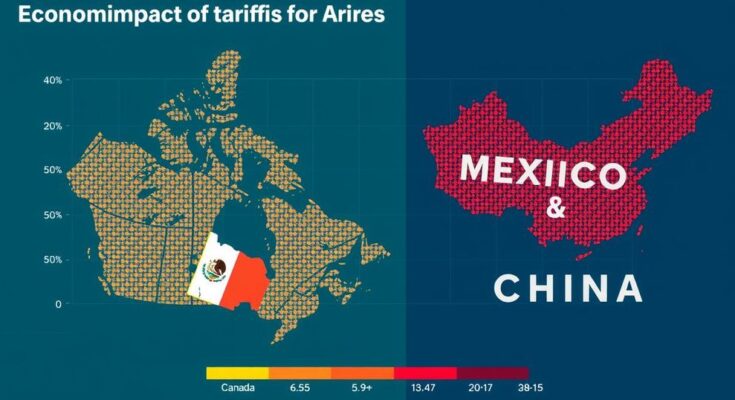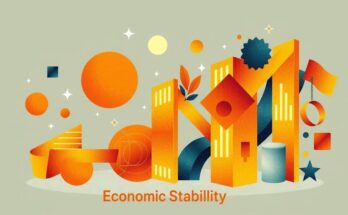Donald Trump plans to impose significant tariffs on imports from Canada (25%), Mexico (25%), and China (10%) starting on his first day in office. This move, aimed at combating illegal immigration and drug trafficking, could lead to increased consumer prices for vital goods. Economists warn of inflationary effects and potential retaliation from the affected nations, raising concerns over the implications for U.S. trade policy and consumer costs.
In a significant political move, President-elect Donald Trump has announced plans to implement tariffs of 25% on imports from Canada and Mexico, along with an additional 10% tariff on products imported from China. Set to take effect on his first day in office, Trump argues that these tariffs are necessary to address issues of illegal immigration and the opioid crisis, particularly the influx of fentanyl from China. Economists predict that if enacted, these tariffs could lead to higher prices for a variety of consumer goods, including essential items such as gasoline and groceries. Both Canada and Mexico are critical trading partners for the United States, with Mexico being the largest, and collectively, the three nations accounted for approximately $1.5 trillion in exports to the U.S.
Trump’s aggressive stance on tariffs is seen as part of his broader strategy to renegotiate trade terms and counteract perceived unfair pricing practices. While some have raised concerns about the economic implications of these tariffs, including possible retaliatory measures from the affected countries, Trump remains firm on his approach. Additionally, Trump’s previous tariff measures against China in 2018 resulted in significant price increases for American consumers and heightened tensions between the two countries. Critics, including some members of Congress, voice apprehension over the ramifications such tariffs may have on ongoing trade agreements, particularly the USMCA, which was designed to facilitate trade between the U.S., Canada, and Mexico.
Economists highlight the inflationary impact of such tariffs, suggesting they may not only strain relations with trading partners but also exacerbate economic burdens on American consumers. Mixed reactions in the financial markets following Trump’s announcement indicate investor skepticism about the implementation of these tariffs. With issues of inflation and rising consumer prices being a top concern for voters, the implications of Trump’s tariff strategies could play a pivotal role in shaping economic policy in the upcoming administration.
The article discusses the implications of President-elect Donald Trump’s plan to impose heavy tariffs on major trading partners, namely Canada, Mexico, and China. Trump argues that these tariffs are necessary for national security and to curb illegal immigration and drug trafficking. The potential repercussions of such tariffs are significant, as they threaten to increase prices on everyday items for U.S. consumers and to strain trade relationships that are pivotal to the American economy. Economists and analysts warn of the inflationary effects of these measures and the likelihood of retaliation from trading partners, suggesting that the proposed tariffs could lead to broader economic challenges and legal disputes involving existing trade agreements.
In conclusion, President-elect Donald Trump’s proposed tariffs on Canada, Mexico, and China present a contentious strategy aimed at addressing illegal immigration and drug trafficking. While some view these tariffs as necessary negotiating tools, there are substantial concerns about their potential to escalate inflation and provoke retaliatory measures from affected countries. As the Trump administration prepares to take office, the focus will remain on how these tariffs might impact consumers and the broader trade landscape.
Original Source: www.usnews.com




